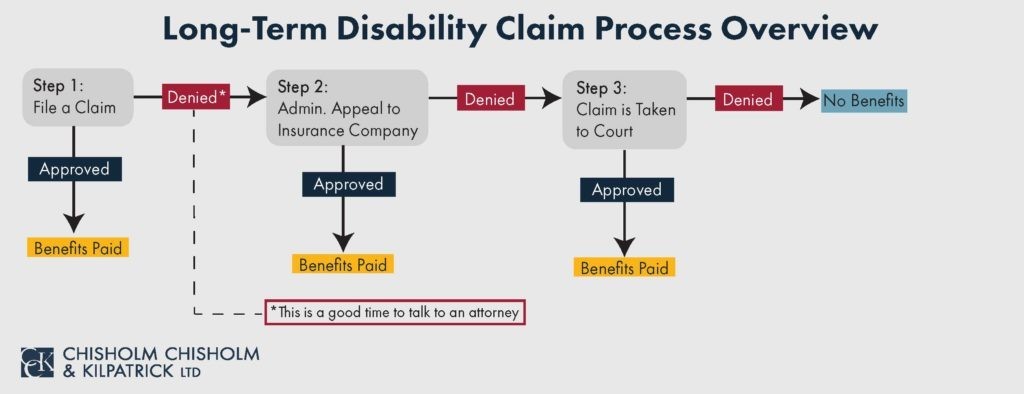Getting Long-Term Disability (LTD) Benefits for Asthma

More than 25 million Americans have asthma, and while its severity ranges depending on the individual, asthma can often be debilitating. For some asthma can be a nuisance, while for others it can have a serious effect on their day-to-day lives and their abilities to work. In such cases, you may need to file a claim for long-term disability (LTD) benefits.
The process of proving asthma as a disability can be difficult, but the attorneys at Chisholm Chisholm & Kilpatrick LTD have the experience and knowledge you need. We work diligently to get you the long-term disability benefits you deserve for your medical condition. You can call CCK today at 1-800-544-9144 for a free consultation.
Understanding Asthma and Its Causes
Asthma is a chronic disease of the lungs that causes the lung’s airways to become inflamed. When this happens, the airways become swollen and produce excess mucus, making it difficult to breathe. It is known as an asthma attack when the lung muscles around the asthmatic airways constrict, narrowing the airways to a dangerous degree. Asthma attacks can cause extreme difficulty in breathing, or obstruct breathing altogether. It is not known why some have asthma while others do not, but it is likely a mix of genetic and environmental factors. It is often diagnosed in children and will last throughout life, but its severity can change over time.
Often, asthma occurs as a result of exposure to certain elements, like airborne allergens, chemical fumes, or pollution. This is commonly known as allergic asthma. Others may suffer from non-allergic asthma, which is typically more severe and can be caused by obesity, conditions that result in reduced lung function, or an excess of white blood cells. White blood cells generally fight infection, but in excess, they can cause inflammation of the airways. Both allergic and non-allergic asthma can be triggered or made worse by exercise, stress, illnesses such as the flu or respiratory infections, dry air, or changes in weather.
Asthma sufferers might experience the disease in different degrees. In mild or controlled asthma, many have intermittent symptoms that flare up several times a month. In these cases, people are able to lead a daily life that is relatively unaffected by their asthma and can control their symptoms with effective treatment. Others suffer severe or uncontrolled forms of asthma.
Severe asthma sufferers might have more frequent symptoms and reactions, such as periodic asthma attacks or constant difficulty breathing, which can them both during the day and at night. If asthma severely interferes with one’s everyday life, even with proper medication and treatment, it is known as uncontrolled asthma. Uncontrolled asthma can require hospital visits and heavy medication, and if left unchecked, can cause permanent damage to one’s lungs.
There is no cure for asthma, and while many are able to manage this disease with medication and lifestyle choices, it can be debilitating for others. Even with proper attention, asthma can seriously affect the lives who suffer from it in its most severe forms.

Symptoms of Asthma
Asthma can vary significantly from person to person depending on severity and triggers. Airways in the lungs become asthmatic when narrowed due to inflammation and excessive mucus. This can cause symptoms that include:
- Chronic coughing
- A wheezing or whistling sound made when breathing
- Shortness of breath
- Chest tightness or pain
- Coughing or wheezing attacks made worse by respiratory illness or infection
- Trouble or disrupted sleep due to difficulty breathing, chest pain, coughing or wheezing attacks
An asthma attack occurs when lung muscles around the asthmatic airways tighten, narrowing the airways to such a degree that one may be unable to breathe. It is incredibly important to seek immediate help if you are having an asthma attack, as severe asthma attacks can be life-threatening. Anyone with any degree of asthma, mild or severe, can suffer an asthma attack.
Signs of an asthma attack include:
- A rapid increase in shortness of breath or difficulty breathing
- Extreme chest tightness or pain
- Severe coughing or wheezing
- Inability to breathe or speak
Asthma Diagnosis and Treatment
In order for asthma to be diagnosed, a doctor will review your medical history and do a physical examination to rule out other possible respiratory conditions, such as COPD or infection. You may be given a lung function test called Spirometry, which is often the predominant test doctors use to confirm asthma. It measures the amount of air one can inhale and exhale, and how quickly.
Additional tests are often administered that may test the gasses you exhale, white blood cell counts in saliva, or your reaction to allergens. Your doctor will then determine the severity of your condition. People with severe asthma may require additional tests to reach this diagnosis.
Asthma treatment varies depending on the severity and triggers of your asthma, but asthma is often treated with medication that helps control the inflammation of the airways and relax lung muscles. Inhalers and nebulizers contain medicine that you can inhale as a mist to ease symptoms and are often used for quick relief from symptom flairs. Other medications that target asthmatic airways can be taken on a more regular basis in tablet or liquid form.
Medications may be prescribed to target the triggers that cause your asthma, not the asthmatic lungs themselves. These medications or antibiotics may fight allergens, prevent infection, or regulate the number of white blood cells in one’s airways.
Often for severe or uncontrolled asthma, corticosteroids are required. While highly effective, these can cause severe side effects. In cases where your symptoms are unaffected by antibiotics or steroids, you may be given bronchial thermoplasty, during which a doctor heats the inside of your airways with an electrode to soothe the tight lung muscles. This is performed in a number of appointments over several weeks.
Part of managing your condition means tracking symptoms in order to administer the correct treatment and can require frequent communication with your doctor. Asthma can become disabling when treatments are not able to keep it under control and it interferes with your everyday life.
How Asthma Can Impact Your Ability to Work
Severe and uncontrolled asthma can have significant effects on your daily life, which can hinder your ability to work. If you are not able to control your symptoms, asthma can cause multiple attacks per day or prolonged attacks that last for hours at a time, both of which are severely inhibiting. Asthma can require extensive treatment, doctor’s visits, and sometimes frequent urgent care or ER visits for those with more severe cases.

Uncontrolled asthma can cause you to wake up at night with symptoms, sometimes multiple times per night. The fatigue brought on by disrupted sleep can affect your ability to focus on your work effectively. Daily symptoms, such as difficulty breathing and chest pain, can also interfere with your ability to perform your job. Though they generally cause severe limitations on physical work, symptoms may also be persistent if you work a sedentary occupation.
Asthma treatments can cause side effects that can impact your ability to work. Oral corticosteroids, highly effective and often taken by those with severe or uncontrolled asthma, can have both short and long-term side effects, including high blood pressure, eye irritation, and memory problems.
Since asthma varies according to the individual, when you file a long-term disability claim, you need to prove why your particular case of asthma disables you. Medical records are commonly submitted as evidence, along with statements from your doctors, personal acquaintances, and others that have witnessed how your asthma disables you.
Chisholm Chisholm & Kilpatrick Can Help You with Your Long-Term Disability Claim
At Chisholm Chisholm & Kilpatrick LTD, our attorneys understand the effects a chronic disease like asthma can have on your life. Our team has the experience to help prove that the effects of your asthma can warrant long-term disability benefits. Whether you are filing an initial claim or appealing a denial, CCK will take care of gathering medical records and other appropriate evidence in order to prove your disability.

Chisholm Chisholm & Kilpatrick’s attorneys will build a case based on witness statements from doctors, family members or coworkers, and outside vocational experts who may be able to perform additional exams. These expert and witness statements can bolster your medical records and further prove that your asthma is a condition that disables you and renders you unable to work effectively.
Sometimes, insurance companies act in their own self-interest and not in the interest of the claimant. They may make it difficult for you to prove your disability by enforcing complicated requirements and demands. You will need to show that your condition meets your long-term disability policy’s definition of disability, and our attorneys will make sure your evidence meets the requirements of that definition. This is especially important in ERISA-governed cases because the administrative appeal is the last opportunity to get evidence into the record. Chisholm Chisholm & Kilpatrick wants you to be able to focus on taking care of your condition instead of the burden of filing for long-term disability.
The legal team at CCK is prepared to fight for the long-term disability benefits you deserve. For a complimentary initial consultation, contact us at 800-544-9144 today.
Share this Post
